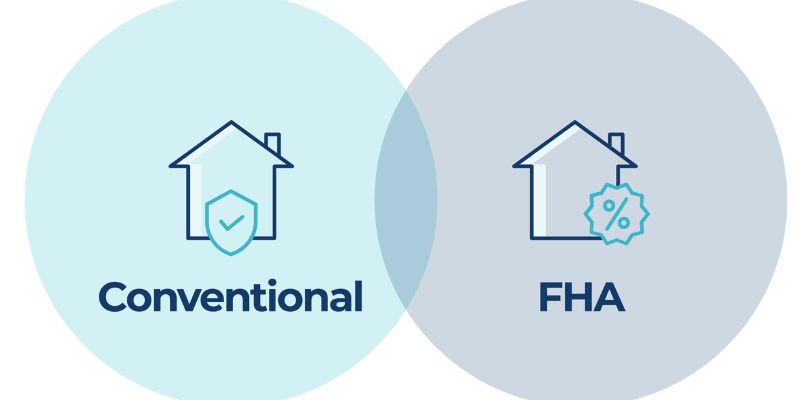FHA VS. Conventional Mortgage
Nov 03, 2023 By Susan Kelly
Are you in the market for a new home but need help determining which type of home loan is best for your situation? If so, consider an FHA or conventional mortgage. Both come with their own set of benefits and drawbacks depending on your individual needs as a homeowner.
In this blog post, we'll discuss what sets FHA versus conventional mortgages apart and provide some tips to help you determine which type of mortgage might be right for you!
FHA Loans vs. Conventional Loans: An Overview

FHA loans and conventional mortgages are popular options for potential homeowners, but it's important to understand their differences before deciding.
FHA loans are insured by the Federal Housing Administration and are designed to help homebuyers with lower incomes or less-than-perfect credit qualify for a mortgage. Conventional mortgages, on the other hand, are not insured by the government and generally require a higher credit score or larger down payment than FHA loans.
Key Differences

Understanding the differences can help you make the best decision for your situation. Here are some key features that differentiate an FHA from a conventional mortgage:
Credit Scores
When it comes to credit scores, one of the primary differences between an FHA and a conventional mortgage is the lower credit score requirements for a borrower to qualify for an FHA loan. With an FHA loan, you can have a credit score as low as 500 with 10% down or 580 with 3.5% down, while conventional loan programs require at least a 620 credit score.
Additionally, FHA loans come with more lenient debt-to-income ratios and allow you to buy a home with less money down. If your credit score is lower than 620 or you need a larger down payment saved up, an FHA loan may be the right choice.
Minimum Down Payments
Regarding down payments, an FHA loan requires a minimum of 3.5%, while conventional loans typically require at least 5%. If you have limited financial resources or want to purchase a more affordable home, an FHA loan may be the best option.
Additionally, there are special programs available through some lenders that allow for even lower down payments on FHA loans. No matter which type of loan you choose, it's important to know that the minimum down payment required may vary depending on the lender and your credit situation.
Debt-to-Income (DTI) Ratios
Regarding debt-to-income ratios, an FHA loan allows for a higher DTI than conventional loan programs. With an FHA loan, you can have a total debt-to-income ratio of up to 50%. This debt-to-income means your income covers all your debts plus the new mortgage payment.
Conventional loans typically require a maximum DTI ratio of around 45%.
This DTI ratio requirement makes an FHA loan more flexible for those with higher debt or lower income. However, it's important to note that even with an FHA loan, your monthly mortgage payment should be at most 31% of your gross monthly income. Ultimately, it's important to determine what type of loan best fits your current financial situation.
Mortgage Insurance
Mortgage insurance is an important part of FHA loans, but not with conventional mortgages. With an FHA loan, mortgage insurance is required for the life of the loan. This insurance protects the lender if you default on your mortgage payments.
On a conventional loan, private mortgage insurance (PMI) is typically required if you make a down payment of less than 20%. This payment is an added cost to the loan but can be canceled once you have paid off enough of the mortgage.
No matter which type of loan you choose, it's important to understand the requirements and costs associated with each option to make an informed decision.
Loan Limits
When selecting an FHA versus a conventional mortgage, it's important to consider loan limits. The Federal Housing Administration (FHA) sets a maximum loan limit for their loans that are based on median home prices across the United States. This loan limit means the maximum loan amount available in your area may be lower than a conventional mortgage.
Not all lenders will offer a loan at the maximum FHA limit. Researching lenders and comparing rates and fees is important to get the best deal possible. A conventional mortgage has no set limits like an FHA loan, which can provide more flexibility if you need a larger loan amount.
Pros and Cons of FHA Loans
Pros:
- Lower down payment and credit score requirements than conventional mortgages, making them easier for first-time homebuyers to qualify.
- Borrowers can use "gift" funds from family members or other sources of income for a portion of their down payment.
- FHA loans offer lenient mortgage insurance requirements with lower premiums than conventional loans.
Cons:
- Mortgage insurance premiums (MIPs) are required for the life of the loan and cannot be canceled like private mortgage insurance (PMI).
- Sellers may be less likely to accept offers backed by FHA loans due to added paperwork and potential delays with appraisals.
- FHA loans typically require a higher debt-to-income ratio than conventional mortgages.
Pros and Cons of Conventional Loans
Pros:
- Often offer lower mortgage rates than FHA loans since they are not government-insured.
- While there may be more strict eligibility requirements for conventional loans, such as a minimum credit score 620, the loan terms are more favorable in the long run.
- PMI can be canceled once the borrower reaches 20% equity.
Cons:
- It may require larger down payments than FHA loans.
- Higher credit scores and financial reserve requirements may make qualifying difficult for some borrowers.
- PMI premiums are often higher than MIPs for FHA loans.
Both conventional and FHA loans provide various benefits to help you become a homeowner. Before making your decision, take the time to evaluate your financial situation and determine which type of mortgage will best meet your needs as a borrower. By doing so, you'll be able to find the loan that provides the most value and is least likely to cause any future problems down the road!
FAQs
What is the difference between an FHA and a conventional mortgage?
The Federal Housing Administration insures an FHA mortgage, while a conventional mortgage is not. This means that FHA loans are backed by the government, offering more lenient qualification requirements, but conventional loans are not government-backed and often have stricter criteria.
Which type of mortgage is better: FHA or conventional?
The better option depends on individual circumstances. FHA mortgages are suitable for borrowers with lower credit scores and limited down payment funds, while conventional mortgages are ideal for those with good credit and a larger down payment.
Each option has advantages and disadvantages, so assessing your financial situation and goals is essential before deciding.
What are the main advantages of an FHA mortgage?
FHA mortgages offer lower down payment requirements, often as low as 3.5% of the purchase price. They also have more flexible credit score criteria, making it easier for borrowers with lower credit scores to qualify.
Additionally, FHA loans allow higher debt-to-income ratios, making them accessible to those with higher debt levels.
Conclusion
Your unique financial condition and aspirations will majorly determine whether an FHA loan or a conventional loan is best for you. FHA loans are frequently simpler to obtain, but they could come with higher closing costs and fewer payment alternatives.
Conventional loans, on the other hand, typically have bigger loan limits and lower interest rates. Before choosing, weigh each alternative's advantages and disadvantages so you can decide which is best for you.








